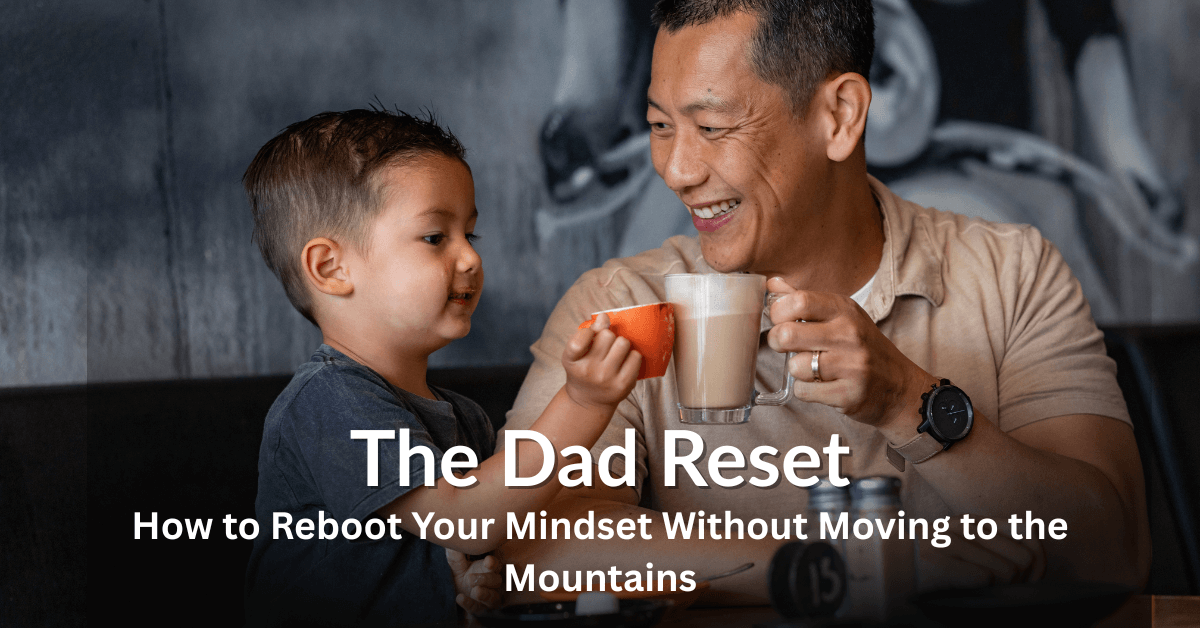🎧Reading is for people without toddlers. Tap play, champ.
22 minutes Read Time
Picture this domestic theatre: You’re standing in your kitchen at 6:47 AM, coffee mug clutched like a life preserver, watching your eight-year-old daughter construct what appears to be an abstract art installation using Cheerios and milk. The milk has achieved that unappetizing beige hue that suggests she’s been stirring for approximately seven minutes, which in breakfast time equals roughly three geological epochs.
Meanwhile, your teenage son communicates exclusively through grunts and door slams. This linguistic evolution somehow makes perfect sense to him, but leaves you feeling like an anthropologist studying an undiscovered tribe. Your partner shoots you that look—the one suggesting you’re somehow responsible for the domestic entropy currently unfolding before your bloodshot eyes.

Welcome to modern fatherhood, where your daily parenting mindset oscillates between profound love and quiet desperation. As a father of three sons and an educator, I’ve been there more times than I’d like to admit. That’s where a mindset reset for dads becomes absolutely crucial—not the kind that requires escaping to a mountain cabin, but the real-world, kitchen-tested variety that works amid the beautiful chaos of family life.
The Mythology of Masculine Escape – Why We All Dream of Running to the Hills
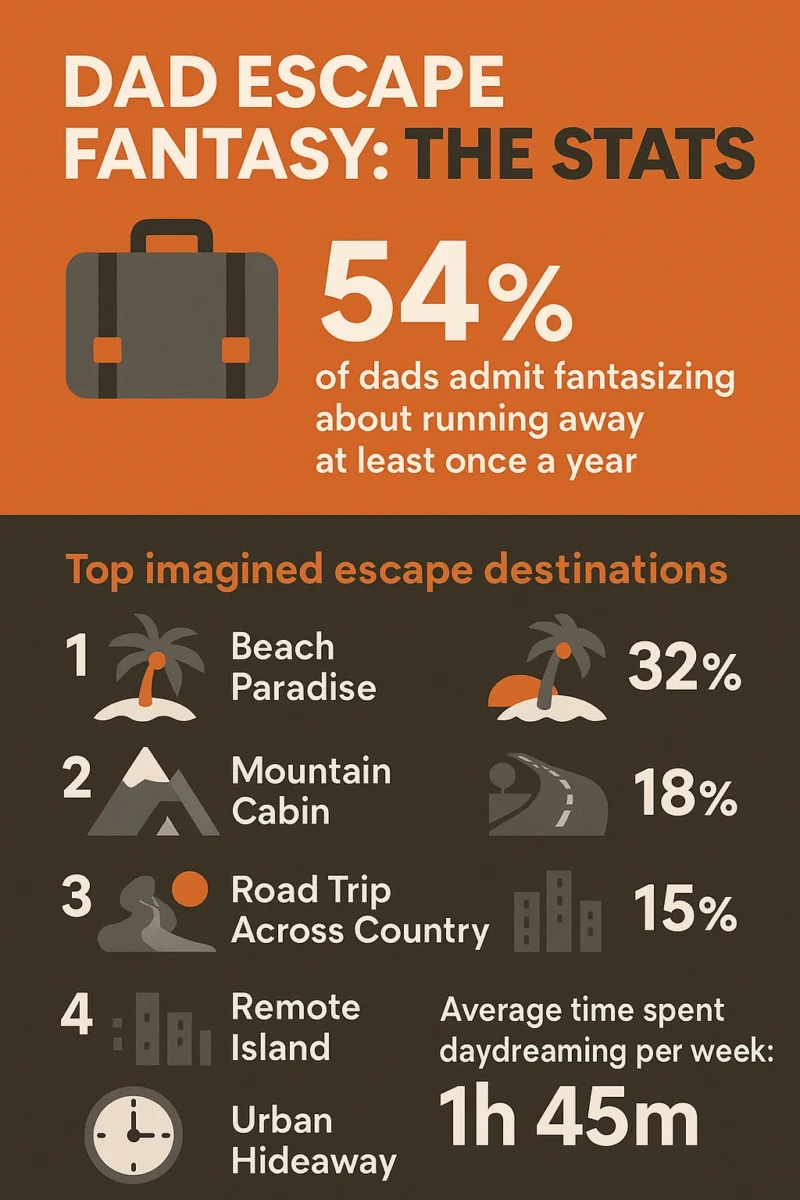
We’ve all entertained the fantasy, haven’t we? That moment when you’re standing in your kitchen, surveying the archaeological layers of family life—yesterday’s homework scattered like ancient manuscripts, this morning’s breakfast remnants forming abstract art installations on surfaces you’re certain you cleaned approximately seventeen times in the past week—and suddenly you’re calculating the logistics of disappearing to a cabin in Montana.
Not abandoning your family, mind you. We’re not monsters. Just… temporarily relocating to a place where the only sounds are wind through pine trees and the distant call of wildlife that doesn’t demand explanations about why dinner can’t be exclusively composed of goldfish crackers.
This escape fantasy has become so culturally embedded that it’s practically a masculine rite of passage. We’ve mythologised the absent father figure—not the deadbeat variety that leaves actual wreckage, but the romantic wanderer who chucks responsibility for self-discovery. Every midlife crisis movie, every Jack Kerouac wannabe with a trust fund, every man who ever looked at his suburban existence and wondered if this is what Thoreau meant by lives of quiet desperation.
The real irony? While you’re fantasising about escaping to find yourself, you’re missing the fact that parenthood is perhaps the most intensive self-discovery program ever devised. It’s just disguised as endless loads of laundry and questions about why the sky is blue and whether dinosaurs would have liked pizza.
The Dad Mindset Reset: Starting Where You Stand
The Japanese Art of Small Changes
The most profound transformations don’t require geographic relocation—they require mental renovation. Consider the Japanese concept of kaizen , which roughly translates to "continuous small improvements." While you’re fantasising about becoming a hermit with excellent Wi-Fi, your actual life is happening in incremental moments that shape both you and your children.
Though making a “small improvement” isn’t about alphabetising your tool rack. It’s about having the guts to look at one tiny piece of your own ugliness today and not flinching. It’s admitting, “Yes, I was a coward in that conversation,” or “I’m procrastinating because I’m terrified of failing.” That’s your “one percent better.” It’s brutal, and it doesn’t feel good. It feels like peeling off a scab.
The paradox of modern parenting: We’re simultaneously told that every moment matters tremendously (no pressure) while being expected to maintain the productivity levels of our pre-child selves.
A mindset reset for dads isn’t about positive thinking or pretending everything’s perfect. It’s about intentionally shifting your mental focus from scattered stress to centred presence. Think of it as hitting the refresh button on your mental browser—clearing the cache of worry, doubt, and overwhelm that’s been slowing you down. You have to own the dark, messy parts of yourself before you can even begin to improve them. Otherwise, you’re just rearranging the furniture in a burning house.
The modern dad faces unique challenges our fathers never dealt with. Research shows that fathers today spend three times as many hours per week on childcare as dads did in 1965. We’re also dealing with increased work demands, social media pressure, and the mental load of managing family logistics. Without a proper mindset reset toolkit, it’s easy to get stuck in a reactive mode rather than a responsive one.
The Science Behind Mental Transformation: Your Brain’s Hidden Superpower
Here’s where things get fascinating, and it’s something every dad needs to understand. Your brain has a built-in filter called the Reticular Activating System, also known as the RAS. Think of it as your brain’s bouncer—it decides what information gets through to your conscious awareness and what gets filtered out.
Understanding the RAS: Your Mental Filter System (Not a Magic Wand)
Let’s be brutally honest for a moment. The way the wellness industrial complex talks about the Reticular Activating System has all the scientific rigour of a horoscope. It’s become the go-to magical acronym for every influencer who wants to sell you the idea that if you think about success hard enough, your brain’s secret universal remote will materialise it in your driveway.
The tragedy isn’t just that this is nonsense; it’s that the actual science is so much more fascinating and, frankly, useful than the cheap magic being peddled.
At its core, the RAS is less a mystical law of attraction and more of a bouncer at the velvet rope of your consciousness. Your brain is bombarded with billions of bits of data every second. The RAS is the network—the system —that checks the guest list. The clue is in the name.
It works with a cocktail of neuromodulators, those chemical playlists that set the mood for your entire cognitive experience. When serotonin is high, you’re in a state of blissful gratitude for what’s right in front of you—the mental equivalent of appreciating a fine meal you already have. But when dopamine kicks in, it’s all ambition and seeking; it’s the buzz of the hunt, the craving for what lies just beyond your grasp.

The RAS is what marries your focus to one of these chemical states, aiming your perceptual spotlight at either the cosy comfort of serotonin or the relentless pursuit of dopamine.
Here’s the dad-specific reality check: That classic example—”I thought about buying a red Bronco, and now I see them everywhere!”—isn’t proof of cosmic ordering power. It’s just your brain’s spam filter being updated with a new keyword. You haven’t altered the universe; you’ve just told your internal search engine to highlight a specific result.
But here’s where it gets interesting for fathers. The same mechanism that makes you notice red Broncos can be strategically deployed in your parenting. If you’re constantly focused on what’s going wrong—the tantrums, the mess, the chaos—your RAS will continue to show you more evidence of those problems. You’ll become exceptionally good at spotting every toy left out, every whine, every moment of disobedience.
However, if you intentionally train your RAS to look for connection opportunities, growth moments, and joy, it’ll start highlighting those instead. You’ll notice your child’s curiosity, their attempts to help, and their genuine excitement about even the most minor things—the same family, in the same situations, but with entirely different experiences.
The key is treating your intention setting less like a prayer and more like providing your brain with a concrete, actionable directive. Writing down “I will connect with my kids today” or “I will notice moments of growth” gives your system something specific to search for. It’s the difference between a sophisticated research query and just yelling “GOOD PARENTING!” into the void.
Neuroplasticity: Your Brain Can Change (Really)
Your brain remains capable of forming new neural pathways throughout your entire life. This means even if you’ve spent years operating in stress-reactive mode, you can literally rewire your responses through consistent practice.
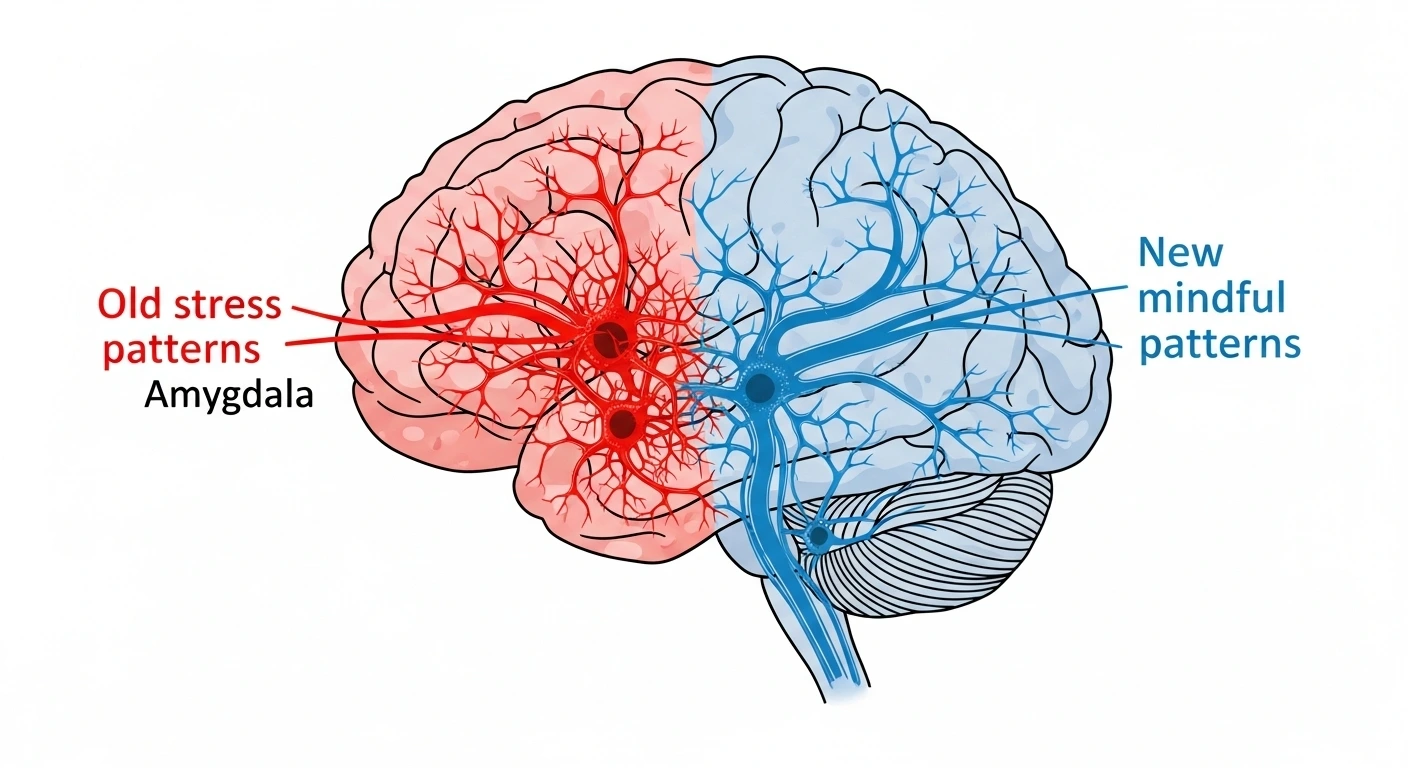
Every time you choose patience over frustration, curiosity over criticism, presence over productivity, you’re strengthening new neural networks. Dr. Michael Posner’s research on attention networks shows that we can actually strengthen our ability to control what we focus on. It’s like building a muscle—the more you practice directing your attention intentionally, the stronger that “attention muscle” becomes.
Growth Mindset Parenting: The Two Carols, When Music Meets Mindset in the Kitchen Laboratory

There’s something about the name Carol that crystallises cultural moments—a near-mystical ability to transform the ordinary into something transcendent. When Carole King sat at her piano in 1971, she wasn’t just making music; she was weaving a tapestry of human experience so universal that fifty years later, we’re still wrapped in its threads, humming along to our own complicated lives.
But here’s where it gets interesting: there’s another Carol whose work has proven equally transformative, though her medium is minds rather than melodies. While Carole King was teaching us to feel the earth move beneath our feet, Carol Dweck was quietly revolutionising how we think about the very ground we stand on—intellectually speaking.
Which brings us to perhaps the most overlooked laboratory for mindset transformation: that suburban kitchen at 6:47 AM, where you’re clutching coffee like a life preserver while watching your eight-year-old construct what appears to be an abstract art installation using Cheerios and milk.
This is where Dweck’s theories meet their ultimate stress test—not in pristine research facilities, but in the beautiful chaos of modern fatherhood.

Of course, there’s a certain irony in discussing a growth mindset in an era where authenticity has become performance art. I was reminded of this recently while reading another piece about our original Carol—not the inspirational autobiography you’d expect, but something closer to sanitised celebrity memoir-speak. Carole King, who once channelled raw human experience into “Tapestry,” had apparently learned the modern art of saying nothing while appearing to reveal everything. Which is curious, really, because her songs never suffered from such strategic ambiguity.
But perhaps that’s the point. In our age of calculated authenticity—where Counting Crows staged “anti-establishment” BitTorrent releases to hype their latest tour, where Mark Zuckerberg’s hoodie becomes a symbol of rebellion against Wall Street while simultaneously becoming Wall Street—the real revolution isn’t about what we say, but how we think.
Here’s where the research gets interesting: Stanford psychologist Carol Dweck's groundbreaking work on mindsets reveals that believing your abilities can be developed (growth mindset) rather than fixed (fixed mindset) fundamentally revolutionises your entire parenting approach. Which sounds wonderfully academic until you’re standing in your kitchen at dawn, watching your offspring perform interpretive dance with breakfast cereal, and you realise you’re about to witness growth mindset theory collide with the beautiful chaos of actual family life.
Because while Dweck was conducting controlled studies with careful variables and measurable outcomes, the rest of us were unknowingly running the messiest, most uncontrolled experiment in human development imaginable: raising tiny humans who possess an almost supernatural ability to expose every fixed mindset we didn’t even know we harboured.
Your eight-year-old announces they’re “terrible at math” with the dramatic finality of someone declaring the end of civilisation, and suddenly you’re faced with a choice that Dweck would recognise immediately. Do you comfort them with platitudes about being “just not a math person” (fixed mindset), or do you lean into the beautiful messiness of learning by saying, “You haven’t figured out this type of math problem yet” (growth mindset)?
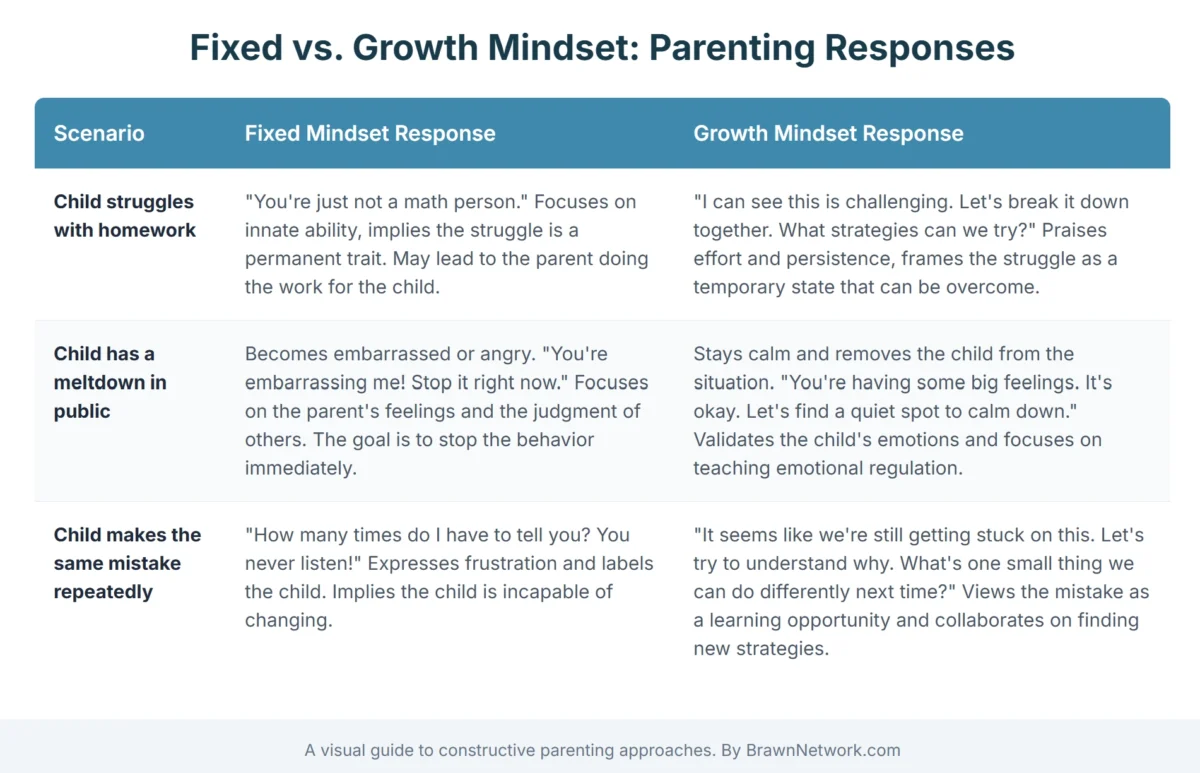
That three-letter word—“yet“—becomes your secret weapon against the tyranny of permanent limitation, both theirs and yours. It transforms “I’m terrible at helping with math homework” into “I haven’t figured out the best way to support my child’s learning yet.” Suddenly, a statement of defeat becomes one of possibility.
Because here’s the thing about a growth mindset: it’s easy to embrace when you’re discussing it in theoretical terms, considerably harder when your teenager communicates exclusively through grunts and door slams, leaving you feeling like an anthropologist studying an undiscovered tribe. That fantasy of escaping to a cabin in Montana suddenly seems less like midlife crisis material and more like strategic retreat planning—a geographic solution to a psychological problem.
Yet this is precisely where Dweck’s work becomes revolutionary. While we’re fantasising about mountain retreats and clean slates, she’s suggesting the most profound transformations happen not through escape, but through reframing. The beautiful irony?
Just as Carole King discovered that stepping out from behind the songwriter’s curtain allowed her to inhabit her own lyrics more fully, Dweck’s mindset work suggests that embracing the messiness of parental imperfection—rather than fleeing from it—might be the fastest route to becoming the father you actually want to be.
And unlike publicity stunts that fade by tomorrow, this kind of mindset shift has staying power. It’s the difference between performing authenticity and actually living it—one “yet” at a time. Which, it turns out, is exactly what both Carols understood: the most profound revolutions happen in the space between our ears, where we decide whether our story is fixed or still being written.
The Effort Over Outcome Philosophy
Traditional parenting focuses on results: good grades, clean rooms, polite behaviour. Growth mindset parenting celebrates the process: the struggle to understand fractions, the attempt to organise belongings, the effort to use an inside voice, even when it feels completely inadequate.
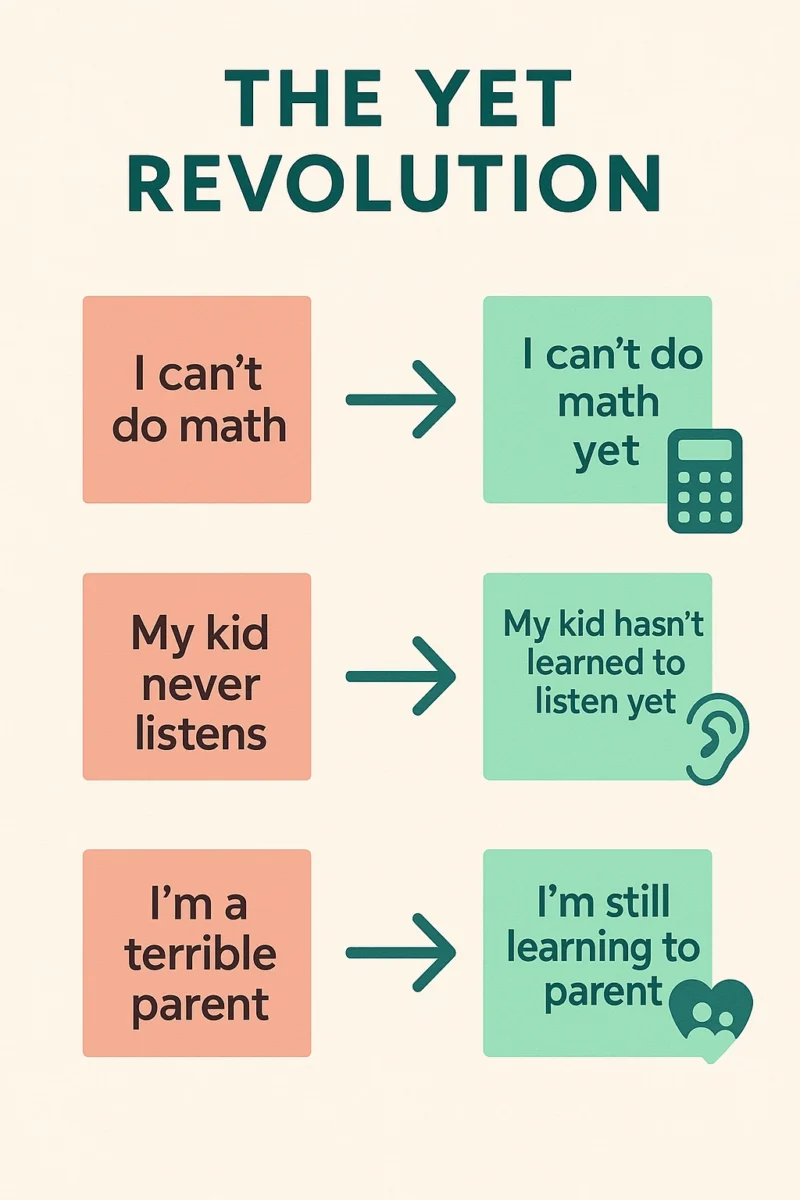
3 Practical Mindset Resets for Overwhelmed Dads: Micro-Interventions in Macro-Chaos
1. The Three-Breath Rule
When chaos erupts—and it will, probably during dinner, possibly involving someone crying about how their food is “touching” other food—take three conscious breaths before responding. This isn’t about achieving zen-like calm; it’s about creating a microscopic pause between stimulus and response.
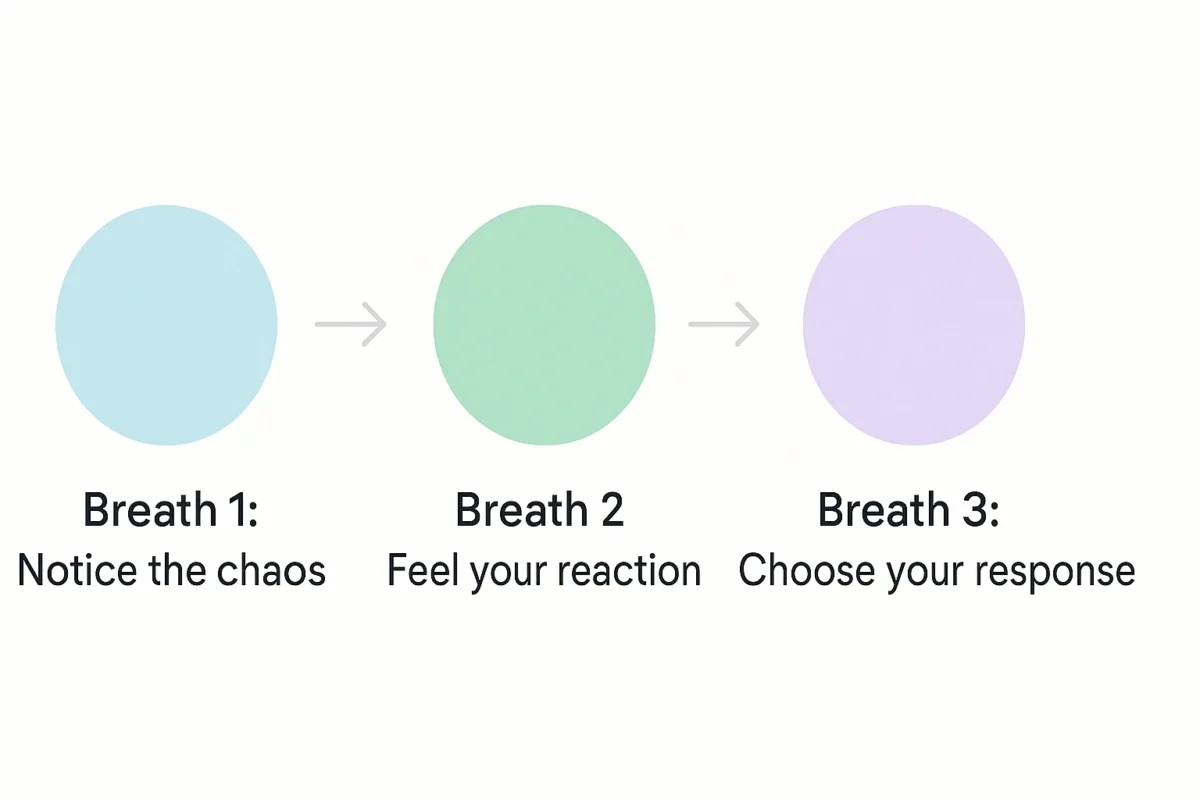
This dad stress management technique sounds deceptively simple until you try it during an actual crisis. Your eight-year-old has just informed you that they have a project due tomorrow requiring a functional model of the solar system, and somehow, this is the first you’re hearing about it.
💭 Breath 1: Acknowledge what you’re feeling (frustrated, tired, overwhelmed)
🎯 Breath 2: Remember your intention for the day (patient, present, purposeful)
🧘 Breath 3: Choose your response from that centred place
2. The Morning Meditation (Disguised as Coffee Ritual)
Transform your morning coffee from mere caffeine delivery into a five-minute mindfulness practice. Stand by your kitchen window. Notice the steam rising from your mug, spiralling upward like tiny ghosts of better sleep schedules.
Listen to the sounds of your household awakening—not as cacophony, but as the soundtrack of a life being lived:
👣 The thump of small feet hitting the floor
🚽 The ritual flush of the upstairs toilet
💥 The mysterious crash from the living room, followed by calculating silence 🤔
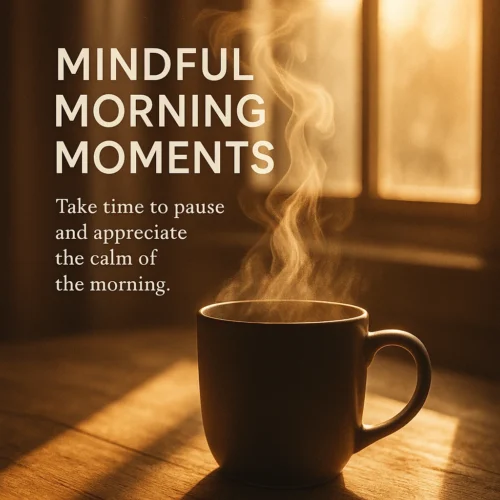
Ask yourself: “What kind of dad do I want to be today?” Maybe it’s patient, playful, present, or purposeful. Choose one word and write it down. This single word becomes your RAS programming for the day.
3. The Heart-Hunt Exercise: A Game-Changer for Dads
This might sound simple, but it’s incredibly powerful. Throughout your day, actively look for heart shapes in your environment. It could be a coffee stain, the way leaves fall, how your kids arrange their toys, or even the shape of clouds.

The genius of the heart-hunt isn’t about finding actual hearts—it’s about training your brain to look for positive symbols and beauty in ordinary moments. When you’re actively searching for hearts, your RAS gets busy filtering for good things instead of problems.
I started this exercise during a particularly stressful period when my youngest was going through a difficult phase. Instead of focusing on his challenging behaviour, I’d hunt for hearts throughout the day. Within a week, I noticed I was seeing more of his sweet moments, his attempts to connect, his genuine struggles, rather than just his defiance.
The Gratitude Hack: Specificity Over Sentiment
Each evening, identify three specific things you’re grateful for. Not generic appreciation (“I’m grateful for my family”), but granular observations:
🦕🛌 “I’m grateful my son shared that completely nonsensical joke about dinosaurs wearing pyjamas”
🎨✨ “I’m grateful my daughter asked me to help with that art project, even though it somehow resulted in glitter in places where glitter should never exist”
This practice literally rewires your brain to notice and remember positive interactions with your kids. Over time, these moments become more prominent in your memory than the challenging ones.
Advanced Mindset Reset Strategies for Busy Dads
Cognitive Bias Modification: Thought Substitution Examples
Cognitive Bias Modification is a fancy term for a simple practice: consciously replacing unhelpful thought patterns with more balanced ones. Here are some common dad thoughts and their reset alternatives:
Instead of: “My kids never listen to me.” Try: “My kids are learning to navigate their own autonomy, and I’m here to guide them.”
Instead of: “I’m failing as a father.” Try: “I’m learning and growing alongside my children.”
Instead of: “This chaos is too much.” Try: “This energy shows my kids feel safe to be themselves around me.”
The Perspective Shift Technique
When you’re in the middle of a difficult parenting moment, ask yourself: “How will I remember this in ten years?” This simple question activates your long-term perspective and often reveals that the current crisis isn’t as significant as it initially feels.
The Ripple Effect: How Your Reset Reshapes Everything
The Invisible Influence
Your mindset reset doesn’t just change your experience—it changes your children’s experience of childhood as well. When you model resilience in the face of daily frustrations, you’re teaching them that challenges are temporary and manageable.
Children learn more from what they observe than from what they’re told:

🔁 If they see you treating mistakes as learning opportunities, → They internalise that mistakes are normal and useful
🧠💆♂️ If they see you taking care of your mental health, → They learn self-care is necessary, not selfish
🌅😊 If they see you finding joy in small moments, → They develop the capacity to do the same
Creating a Culture of Intentionality
Families develop cultures just like organisations do. When a mindset reset becomes part of your family culture, everyone benefits. Your kids learn to pause before reacting, to look for the good in situations, and to approach challenges with curiosity rather than anxiety.
Reframing the Chaos: A Philosophical Approach
Seeing Differently, Not Escaping
That explosion of toys across your living room? It’s not evidence of your failure as a parent—it’s evidence of imagination in action. The mysterious stains on your shirt? Battle scars from active parenting, proof that you showed up when someone needed you.
🏡✨ Messy house → Active childhood happening
😤➡️🧠 Tantrums → Emotional development in progress
❓🧠 Constant questions → Curious mind at work
🛌🛑 Bedtime resistance → Independence emerging
Your teenager’s sullen silence? A necessary developmental phase that tests your resolve to remain civilised while they practice becoming a separate person. Adolescence is essentially a prolonged experiment in boundary testing, where every interaction becomes diplomatic relations with a hostile nation that shares your refrigerator.
Check
out The
“10 Micro-Mindset Shifts for Dads”
and start rewiring your parenting responses today.
Building Your Personal Mindset Reset Toolkit
Every dad’s situation is unique, so your mindset reset toolkit should be personalised to your family’s needs and your personality. Here’s how to build yours:
Start with One Practice
Choose the single practice that resonates most with you and commit to it for two weeks. Don’t try to implement everything at once. Maybe it’s the morning intention setting, or maybe it’s the heart-hunt exercise. Pick one and make it automatic before adding anything else.
Track Your Progress
Keep a simple log of your daily practice. Not to judge yourself, but to notice patterns. You might discover that your mindset resets work better in the morning, or that certain days of the week are more challenging.
Adapt for Your Family’s Rhythm
A mindset reset for a dad with toddlers looks different from one for a dad with teenagers. Honour your unique situation instead of trying to force someone else’s system.
Frequently Asked Questions About Mindset Reset for Dads
How long does it take to see results from a mindset reset practice?
Most dads notice small shifts within the first week—maybe they’re less reactive to minor frustrations or more aware of positive moments with their kids. Deeper changes typically develop over 3-4 weeks of consistent practice. Remember, you’re literally rewiring neural pathways, which takes time.
What if I forget to do my mindset reset?
Forgetting is normal and expected. The key is to restart without judgment. Missing a day doesn’t erase previous progress. Some dads find it helpful to link their reset practice to an existing habit, like brushing their teeth or starting their coffee.
Can a mindset reset help with serious parenting challenges?
While mindset reset techniques are powerful, they’re not a substitute for professional support when dealing with serious issues like depression, anxiety, or significant behavioural challenges with your children. Think of a mindset reset as a foundational practice that supports overall well-being.
How do I explain this to my partner?
Share your experience rather than trying to convince them to join you. You might say something like, “I’ve been trying this simple practice to help me stay more centred as a dad, and it’s been really helpful. I’m curious if you’d be interested in hearing about it.”
What’s the difference between reactive and responsive parenting?
When we’re reactive, we’re operating from a place of stress and survival. When our kids spill something, we immediately feel frustrated. But when we’re responsive, we pause. We choose our reaction. We see the bigger picture. That spilt juice becomes a teaching moment rather than a crisis.
The Long Game: Perspective From the Future Self
What Really Matters
Twenty years from now, your children won’t remember whether the house was always tidy or if you consistently had your act together. They’ll remember:
🤝 How you made them feel when they struggled
🔄 How you responded when things went sideways
⏳💗 Whether you were present for small moments that felt enormous to them
🗣️🎵 Your tone of voice more than your words
🙋♂️💔 Your willingness to be imperfect, more than attempts at perfection
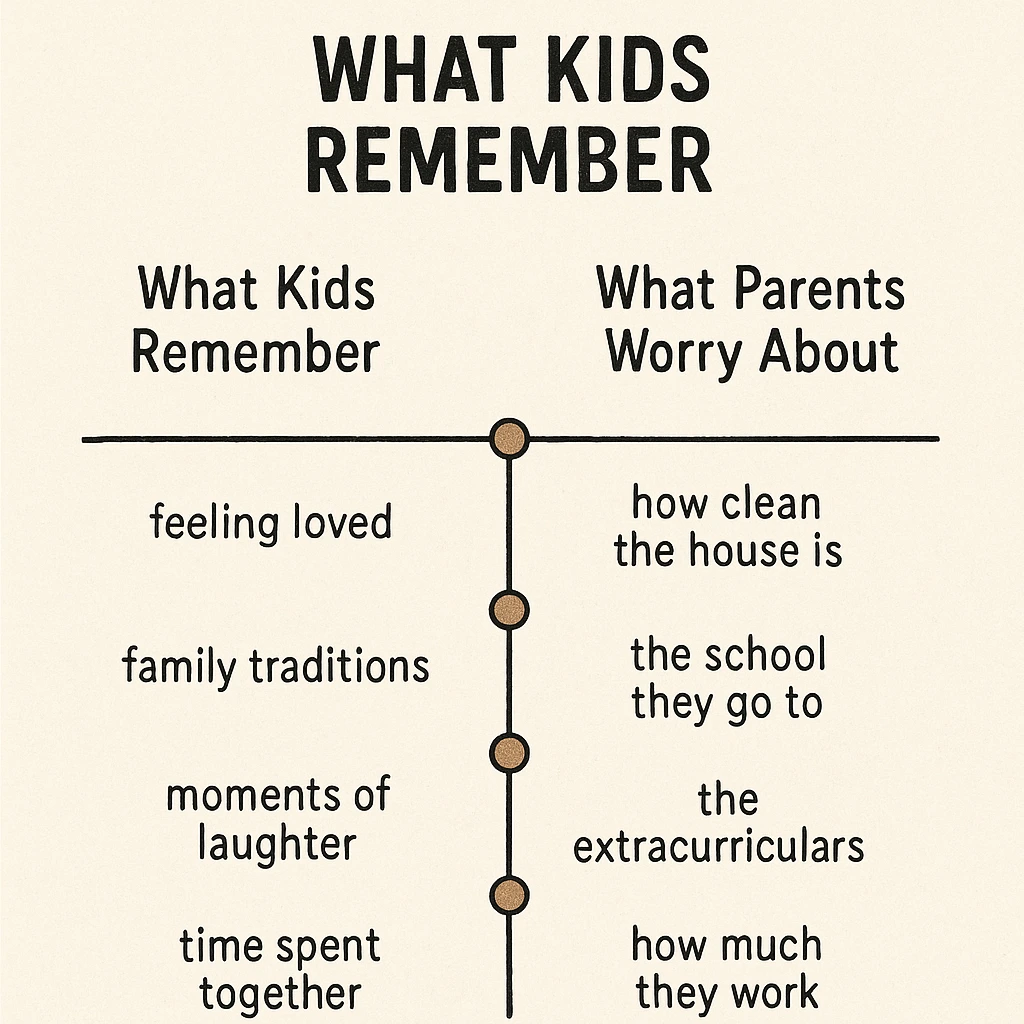
Scientific Research Supporting Mindset Reset Practices
The effectiveness of mindset reset isn’t just anecdotal—it’s backed by solid research. Dr. Michael Posner’s work on attention networks demonstrates that we can literally train our brains to focus more effectively. His studies show that regular attention training increases activity in the anterior cingulate cortex, the brain region responsible for monitoring conflicts and maintaining attention.
Research on neuroplasticity reveals that our brains continue to change throughout our lives, based on our experiences and practices. Studies on gratitude practices have shown measurable changes in brain structure and function, with increased activity in the hypothalamus (which regulates stress) and in the dopamine system (associated with pleasure and reward).
Conclusion: The Reset as Daily Practice
The mountain cabin will still be there when you’re ready, probably with the same romantic appeal and fundamental disconnect from the reality of your actual life. But right now, in your imperfect kitchen with its sticky floors and coffee-stained counter, you have everything you need for the most important transformation of your life.
A mindset reset for dads isn’t about becoming perfect or never having difficult moments with your children. It’s about approaching fatherhood with intention, presence, and a sense of purpose. It’s about training your brain to notice connection opportunities instead of just problems, and to respond from a centred state instead of a reactive one.
The reset happens not on a mountain, but in a moment. And you get a new moment every few seconds for the rest of your life. The reset isn’t a destination—it’s a daily decision to choose:
🌱➡️🪴 Growth over stagnation
👁️🗨️🤲 Presence over perfection
🤝❤️ Connection over control
Your kids don’t need a perfect dad. They need a dad who’s willing to grow, to pause before reacting, to look for the good in ordinary moments. They need a dad who’s doing his own inner work so he can show up as his best self for them.
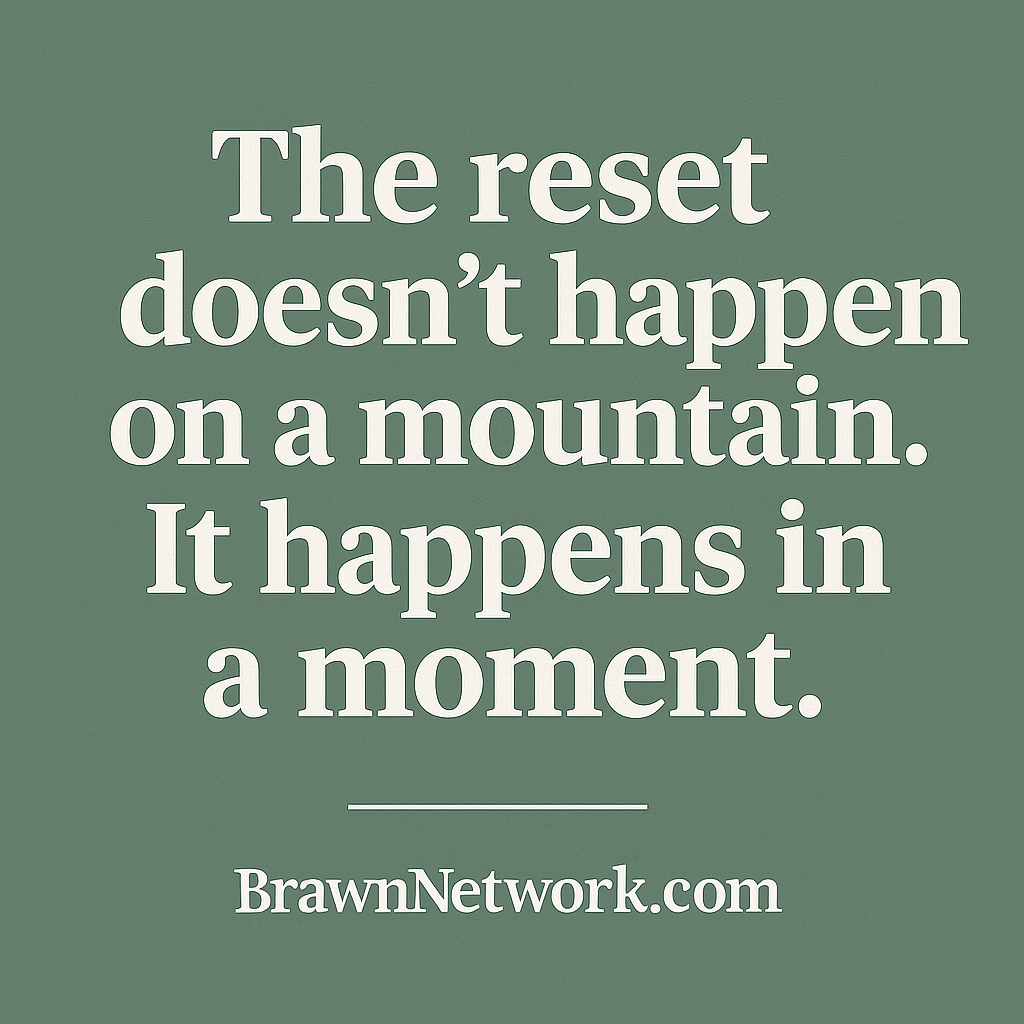
No altitude required. No escape necessary. Just you, right where you are, deciding to see your life as it is rather than as it should be. Every time you choose responsiveness over reactivity, every time you redirect your attention from problems to possibilities, you’re not just changing your own experience—you’re modelling for your children what intentional living looks like.
Start small. Pick one practice. Be consistent. And watch as your entire experience of fatherhood begins to shift.

